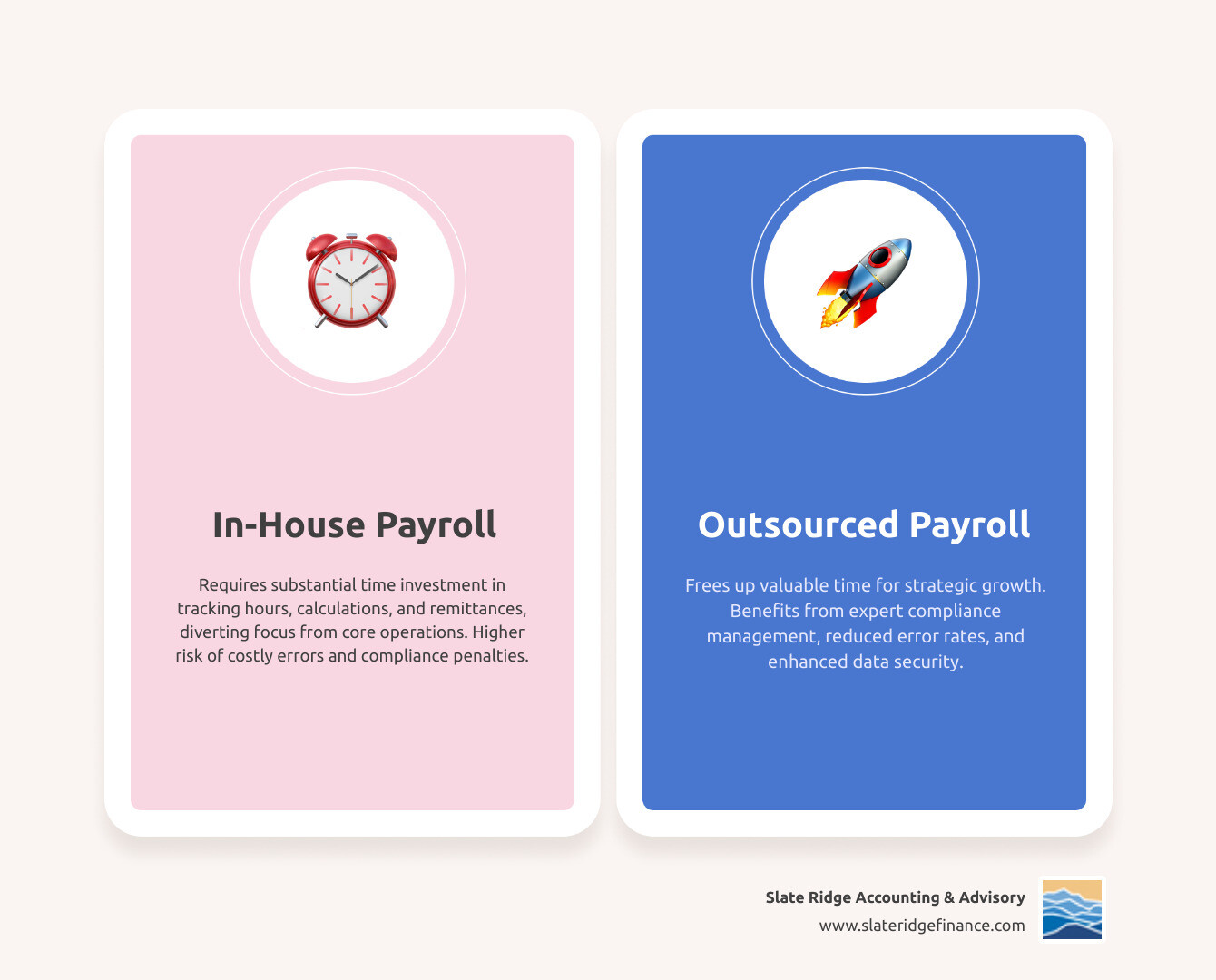Why Payroll Management Services Are Essential for Growing Businesses
Payroll management services handle the complex process of paying employees accurately and on time while ensuring full compliance with tax laws and employment regulations. These services can be delivered through software platforms, full-service providers, or co-employment arrangements like PEOs and EORs.
Core payroll management services include:
- Pay calculation - Computing wages, overtime, and deductions
- Tax withholding - Managing federal, state, and local tax deductions
- Tax filing - Filing payroll taxes and making payments to the IRS and state agencies
- Direct deposits - Electronic payment processing to employee accounts
- Compliance management - Staying current with federal and state regulations
- Year-end reporting - Preparing W-2s and other required forms
- Employee self-service - Online access to pay stubs and tax documents
For small business owners, payroll is one of the most time-sensitive and error-prone administrative tasks. A single mistake in tax calculations or a missed filing deadline can result in costly penalties from the IRS. The right payroll solution can transform administrative chaos into streamlined operations.
Research shows that the vast majority of clients who choose professional payroll services choose to stay, demonstrating the significant value these services provide. The trend toward outsourcing these critical functions continues to grow as businesses recognize the benefits.
The complexity of payroll extends beyond simple wage calculations. Modern payroll management encompasses statutory compliance, employee benefits administration, time tracking integration, and detailed reporting—all while maintaining strict data security standards.

Core Functions and Benefits of Outsourcing Payroll
Payroll can feel like a labyrinth of numbers, regulations, and deadlines. It's not just about cutting checks; it's about ensuring your most valuable asset—your employees—are paid correctly and on time, while keeping the tax authorities happy. That’s where robust payroll management services come into play.

What are the core functions of payroll management services?
At its heart, payroll management services cover a comprehensive range of tasks to ensure a smooth and compliant pay cycle. These include:
- Accurate Pay Calculation: Computing gross wages, overtime, commissions, and bonuses, while ensuring compliance with state and federal regulations regarding sick leave and minimum wage.
- Tax Withholding and Filing: This critical aspect includes calculating and remitting payroll taxes like FICA (Social Security and Medicare), federal and state unemployment (FUTA/SUTA), and income taxes. Staying up-to-date with tax rates is crucial to avoid penalties.
- Direct Deposits: Modern payroll services facilitate direct deposits, making paydays seamless for employees and reducing administrative burdens.
- Pay Stubs and Statements: Providers generate detailed pay statements outlining earnings, deductions, and net pay, as required by law.
- Year-End Forms and Reporting: This covers the preparation and filing of W-2s and 1099s, essential for both your team and the IRS.
- Compliance Management: A major benefit. Payroll providers ensure adherence to ever-changing federal and state regulations, including determining employee vs. contractor status.
- Benefits Administration: Many services assist with managing employee health benefits and retirement contributions, integrating them into the payroll process.
These functions, when handled expertly, take a significant load off your shoulders, allowing you to focus on the strategic aspects of your business.
In-House vs. Outsourced Payroll: Which is Right for You?
The decision to manage payroll in-house or outsource it is pivotal. While a DIY approach might seem like a cost-saver, the hidden costs of time, potential errors, and compliance risks can quickly add up.

Here's how they stack up:
- Time Commitment:
- In-house: Extremely time-consuming, especially as your team grows. It can divert significant attention from core business functions. As one client noted, they found managing payroll internally "time-consuming and diverting focus from core business operations."
- Outsourced: Frees up countless hours, allowing you to focus on growing your business.
- Compliance Risk:
- In-house: High risk of costly penalties if mistakes are made. Staying updated on ever-changing tax laws across all states is a full-time job.
- Outsourced: Payroll services are experts in compliance. They ensure your business adheres to all statutory requirements, reducing the risk of fines and audits.
- Expertise:
- In-house: Requires in-depth knowledge of payroll and tax laws, which may not be available within a small business.
- Outsourced: You gain access to a team of certified professionals and modern software, ensuring accuracy and efficiency.
- Scalability:
- In-house: Becomes increasingly complex as your employee count grows or you expand into new states.
- Outsourced: Providers offer scalable solutions that adapt to your growth without additional infrastructure investment.
- Data Security:
- In-house: Requires robust internal security measures to protect sensitive employee data.
- Outsourced: Reputable providers invest heavily in secure systems and encryption to safeguard your information.
At Slate Ridge Accounting & Advisory, we believe that outsourcing your payroll allows you to leverage our modern, personalized, and industry-custom financial solutions. This means you can focus on tracking your KPIs and forecasting growth, rather than getting bogged down in the minutiae of payroll.
To learn more about how our services can benefit your business, visit More info about our services.
Navigating the Different Types of Payroll Management Services
Finding the right payroll management services means choosing a solution designed for your business size, control preference, and growth stage.

Full-Service vs. Self-Service (Software)
The biggest decision is how much control you want to keep versus how much you're willing to hand over.
Full-service payroll is a "set it and forget it" solution. These providers handle everything: calculating wages, processing direct deposits, filing payroll taxes, and preparing year-end forms like W-2s. A key feature is dedicated support, giving you an expert to contact directly.
With full-service providers, automated tax filing happens behind the scenes. They stay on top of regulatory changes, acting like a payroll expert on your team without the overhead.
Self-service software puts you in the driver's seat. These cloud-based platforms have intuitive interfaces where you input employee hours and process payroll with guided steps. The software handles complex calculations, but you maintain user control.
Modern self-service solutions often include employee portals for viewing pay stubs and submitting timesheets, reducing your administrative workload. The integration capabilities with accounting software are also a game-changer, eliminating double data entry.
Understanding PEO and Employer of Record (EOR)
For businesses seeking comprehensive HR support or expanding their reach, Professional Employer Organizations (PEOs) and Employers of Record (EORs) offer sophisticated solutions.
A Professional Employer Organization (PEO) creates a co-employment relationship with your business. The PEO handles payroll, tax filing, and provides access to better employee benefits, while you retain control over day-to-day employee management. This HR outsourcing model gives small businesses access to enterprise-level benefits and HR expertise.
An Employer of Record (EOR) takes it a step further by becoming the legal employer of your staff. This model is ideal for hiring in new states or internationally. The EOR handles all legal, HR, tax, and payroll responsibilities in the new location, while you manage your employees' daily work. An EOR is an expansion shortcut, handling the compliance heavy lifting so you don't have to establish new legal entities.
The beauty of today's payroll management services landscape is that you're not locked into one model. As your business evolves, you can adjust your payroll solution to match your changing needs.
Ensuring Compliance and Security in Payroll
Imagine running your business smoothly when the IRS sends a penalty notice. This is why compliance and security in payroll aren't just nice-to-haves—they're essential for protecting your business and your employees' sensitive information.

Staying Compliant with U.S. Regulations
U.S. payroll regulations are a complex web of federal, state, and local laws. Professional payroll management services make it their business to stay on top of these ever-changing requirements so you don't have to.
Federal regulations form the backbone of payroll compliance. The Internal Revenue Service (IRS) sets strict requirements for withholding income taxes and FICA taxes (Social Security and Medicare). For detailed federal guidance, see the IRS Employer's Tax Guide (Publication 15) at IRS Publication 15. Miss a tax deposit deadline or calculate deductions incorrectly, and you could face significant penalties.
State and local laws add another layer of complexity. Each state has its own rules about minimum wage, overtime, sick leave, and unemployment insurance taxes (SUTA). For an overview of federal wage and hour rules, review the U.S. Department of Labor’s FLSA resources at DOL FLSA. Keeping track of these differences is overwhelming for busy business owners.
Tax law updates happen frequently. New regulations, rate changes, and policy updates can affect your payroll obligations. Professional payroll providers continuously monitor these changes and update their systems automatically, so you're always compliant without having to become a tax law expert.
Payroll mistakes aren't just embarrassing—they can be expensive. That's why many smart business owners work with experts who live and breathe compliance. Speaking of costly mistakes, you might find our insights on 3 Bookkeeping Myths That Could Be Costing You Money helpful for avoiding other financial pitfalls.
How Providers Protect Your Employee Data
Your employees trust you with their most sensitive information: social security numbers, banking details, and salary information. Reputable payroll management services treat data security as a top priority.
Data encryption is the foundation of modern payroll security. It turns your sensitive information into a secret code that only authorized systems can read, protecting it both in transit and at rest.
Secure cloud hosting means leading providers use enterprise-grade platforms with security measures far beyond what most small businesses can implement, including redundant backups and 24/7 monitoring.
Multi-factor authentication (MFA) adds a crucial extra layer of protection, requiring a second form of verification to prevent unauthorized access.
Access controls ensure that only the right people can see and modify payroll information, allowing you to set permission levels for different users.
Privacy policies and regular audits demonstrate a provider's commitment to data protection. The best providers undergo independent security audits to prove they are following industry best practices. When evaluating partners, ask about their security measures—your employees' trust and your business's reputation depend on it.
Choosing the Right Provider for Your Business
Finding the perfect payroll management services provider means looking for a partner who understands your business and can make your life easier. There are clear criteria to help you make the right choice.
Key Factors to Consider When Selecting a Provider
Choosing a payroll provider is a foundational decision for your business's growth. The right partner will evolve with you.
- Scalability: The provider should handle growth seamlessly, whether you're adding your first employee or your hundredth.
- Integration Capabilities: A system that connects smoothly with your accounting software eliminates manual data entry and reduces errors, giving you a clearer financial picture.
- Customer Service Model: Look for providers who offer dedicated support from a real person who understands your business, not just a generic call center.
- User-Friendliness: The platform should be intuitive and easy to steer, making payroll a routine task, not a chore.
- Reporting Features: Comprehensive, customizable reports help you understand labor costs, track trends, and plan for the future.
- Industry-Specific Solutions: Consider whether a provider understands the unique payroll needs of your industry. At Slate Ridge Accounting & Advisory, we know a construction company's needs differ from a retail business.
If you have questions about how we help clients steer these decisions, check out our FAQ section.
Understanding the Cost and Value of payroll management services
While cost matters, value matters more. The cheapest option is rarely the most economical in the long run.
Most payroll management services use a straightforward pricing model with a base monthly fee plus a per-employee charge. Ask for a detailed breakdown of all potential charges to avoid hidden costs.
To calculate your return on investment (ROI), consider the hours you save on payroll, the cost of potential compliance penalties, and the peace of mind you gain. The time you save can be redirected toward revenue-generating activities, making the service a valuable investment.
For specific pricing information about our integrated accounting and payroll solutions, visit our pricing page.
Beyond Payroll: HR and Benefits Integration
Modern payroll services have evolved beyond just cutting checks. The best providers offer integrated solutions for all your people-related administrative tasks.
- Time and Attendance Tracking: Integration eliminates manual data entry from timesheets.
- Benefits Administration: Connecting benefits to payroll ensures accurate deductions for health insurance, retirement plans, and more.
- HR Support: Many providers offer help with employee onboarding and compliance guidance.
- Employee Self-Service Portals: These portals allow your team to access pay stubs, update personal information, and request time off online, saving you administrative time.
These integrated solutions offer a unified platform that simplifies everything from hiring to benefits management.
Want more insights on optimizing your business operations? Explore our blog for practical tips and strategies that can help streamline your entire financial management process.
Frequently Asked Questions about Payroll Services
We hear the same questions about payroll management services from business owners every day. Let's tackle the big ones.
Can a small business do its own payroll?
Yes, you can handle payroll yourself, especially with just a few employees. However, DIY payroll is time-consuming and risky. One missed IRS deadline or miscalculation can result in penalties that far exceed the cost of professional services. As your team grows, the complexity of juggling federal and state tax laws multiplies. Outsourcing payroll is about risk management and strategic focus, buying back your time to focus on what you do best.
What is the difference between a PEO and an EOR?
A Professional Employer Organization (PEO) enters a co-employment relationship with you, sharing employer responsibilities. The PEO handles administrative tasks like payroll, benefits, and tax filings, while you manage your employees' daily work.
An Employer of Record (EOR) becomes the full legal employer of your staff. You retain operational control, but the EOR handles all legal, HR, and payroll duties. This is ideal for hiring employees in new states or countries without establishing a local legal entity.
In short: a PEO shares employer duties, while an EOR takes on the legal employer status for you.
How much do payroll services typically cost?
There's no single answer, but most payroll management services use a base fee plus a per-employee model (e.g., a $40 base fee plus $5 per employee, per pay run). The cost depends on your number of employees, pay frequency, and the level of service you need.
However, the real value is in the costs you avoid. A single IRS penalty can cost hundreds or thousands of dollars. When you factor in the time savings and peace of mind, the return on investment is clear. You're not just paying for processing; you're investing in compliance protection and efficiency.
Conclusion
Managing payroll doesn't have to be your biggest administrative headache. As we've explored, payroll management services transform a complex, high-risk task into a smooth, reliable process that works for your business.
This is a strategic shift that lets you reclaim hours every week, avoid costly penalty notices from the IRS, and ensure your employees are paid accurately and on time. The right partner brings expertise, technology, and priceless peace of mind.
The key takeaway? Your time and energy are your most valuable assets. Outsourcing payroll allows you to stop worrying about tax compliance and focus on what you do best: growing your business.
At Slate Ridge Accounting & Advisory, we see payroll as a crucial piece of your financial puzzle. As your cloud-based accounting partner, we provide virtual bookkeeping, financial clean-up, and advisory services that work together seamlessly. Our modern, personalized approach means your payroll integrates with your overall financial management, giving you the complete picture you need to track KPIs and forecast growth with confidence.
Choosing the right partner means finding someone who will handle the numbers so you can focus on the vision.
Ready to transform your payroll from a source of stress into a streamlined operation? Let's chat about how we can customize our services to fit your unique business needs.
Ready to get started?
Book a free consultation today and let’s explore how Slate Ridge can support your business with expert accounting that’s accurate, timely, and built around your goals.






